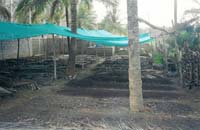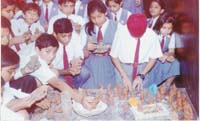|
The CLEAN-India Brigade
- The march is
on...
CLEAN-Dindigul CLEAN-Dindigul
has taken up the cause of freeing the residents of 11th Cross road of
Clearly, lot of hard work and some great thinking! CLEAN-Nagercoil Kanyakumari District has an average rainfall of 1400-1800 mm. However, given the topography of the area and the absence of a proper system for rain water harvesting, most of the rainwater drains into the sea. As a result, the district faces acute shortage of drinking and irrigation water. Most of the water for usage is extracted from ground through bore wells and open wells. Sea water intrusion further worsens the quality of ground water in coastal areas.
CLEAN –Nagercoil is currently involved in spreading awareness in communities of Kanyakumari on the significance of rainwater harvesting. Suitable aquifers have been selected for ground water recharge. Suitable and economical designs for rainwater harvesting at community and household level have been selected. It is planned to collect the rainwater by roof –top harvesting method. Water will be stored in ferrocement tanks and the rest of it will be recharged into the ground. These tanks are cheap and easy to construct. Members of the community are being trained for the setting up of these systems. CLEAN-Nagercoil has sown the seeds. Given all the hardwork that it has put in, the harvest is bound to be good. CLEAN-Kodaikanal CLEAN-Kodaikanal students conducted tree plantation activities in a number of communities. Prizes were given to the communities which had taken good care of these trees and protected them from animals etc. Besides, the students also identified the major sources of plastic waste in the community. They are now targeting shopkeepers and prompting them to use alternatives to plastic carrybags. The students, through continuous monitoring have detected contamination in an open stream which provides drinking water to the community in Survey Number Colony in Kodaikanal. The colony has no access to piped municipal water supply. The water was found to contain high turbidity and disease causing bacteria. The students have convinced the community for setting up of a slow sand filter. The community is very enthusiastic and have agreed to take responsibility for the operation and maintenance of the system. The land for the same has already been identified. The kids have shown them not just the problem but also gave them solutions. CLEAN-Kodai, way to go! CLEAN-Kurnool CLEAN-Kurnool organised the Students Summit on Sustainable Development (SSSD) on 5th February 2005. The Theme was Energy Crisis and Solutions (Solar, Bio-fuel and Bio-mass). The summit included paper presentations and exhibitions by students. CLEAN-Kurnool has been very actively promoting the use of bio-fuels. Taking on this initiative, the Forest Department now plans to take up plantations of Pongamia and Jatropha (oil –yielding plants) in 280 villages of Kurnool district. Now, that’s some powerful impact! CLEAN-Pudukkottai CLEAN-Pudukkottai students carried out massive tree plantation at Malaiyeedu village of Pudukkottai District. An awareness programme on the importance of trees was conducted, following which, 250 seedlings of various tree species were distributed to the community. The species included Neem, Pungan, Vadanarayanan, Poovarasu, Nelli and Flame of the Forest. The community was encouraged to plant them along the roads and also take responsibility for their aftercare. Vermi-compost was provided. The community is taking good care of the plantations. The survival rate of the plants has been found to be high. Replantation is being done in places where the saplings have withered away. CLEAN-Pudukkotai surely knows the importance of being persistent. CLEAN-Pondicherry CLEAN-Pondicherry students held community awareness programmes, interacted with the community, while educating them on issues of water and waste management. CLEAN-Mysore Scores of varieties of medicinal herbs are fast disappearing due to rampant deforestation and lack of awareness. The future generations may be left bereft of precious knowledge regarding these species and also the advantages of their use over modern medicines. CLEAN-Mysore took up the cause of educating school children on medicinal herbs and motivated them to set up medicinal herbs in schools and communities. A training programme on setting up of herbal corners was also organised in the community. If you want to know the world, start by first knowing the tiny herb near your feet. CLEAN-Bangalore CLEAN-Bangalore has successfully set up rainwater harvesting systems in two places, namely Aishwarya Apartments, J.P. Nagar and APSA’s Dream School, Vimanapura. The rain water harvesting units were designed by the CLEAN students of Innisfree House School and St. Joseph’s Indian High School respectively. It has also successfully initiated vermicomposting in association with T. Muniswamappa Trust. It is a full-fledged Solid Waste Management programme at Avalahalli, Bangalore with the trust, which runs the Gurukul School, a CLEAN-India member. At present, 700 households are part of this programme. Each household is given two bins, one each for biodegradable/organic waste and non-biodegradable waste. The organic waste is sent for vermi-composting and the non-biodegradable waste is partly recycled while the rest goes to the landfill. The vermi-compost thus prepared is sold to institutions and individuals. The same action program was showcased by the CLEAN students at the Annual CLEAN-India Meet, 2005 and bagged the first place for the display on the theme of Community Action. CLEAN-Muzaffanagar CLEAN-Muzaffanagar is using school children to motivate communities and implement environment management initiatives. For instance, Door-to-Door Campaigns and Rallies were organized by the students to spread awareness on Solid Waste Management in two colonies (Muneem Colony, Patel Nagar and Jat Colony, Circular Road). This was followed up with a Workshop of Residents Welfare Organisation. The residents got motivated and are now in the process of constructing pits for composting. CLEAN-Lucknow CLEAN-Lucknow has successfully put a vermi-composting system in place in a huge temple. The system is being managed by the temple devotees and the management. The flowers offered by devotees are turned into rich compost which is being bought by the devotees themselves. The first harvest weighed around 250 kgs and the second one 400 kgs. The system is used to create awareness & motivate the visitors to practice composting and the need to maintain cleanliness. Model community action! CLEAN-Varanasi CLEAN-Varanasi has successfully implemented solid waste management systems in three colonies and have selected four others to start the same. CLEAN-Varanasi has started working with the Municipal Corporation & Jal Board to create the much needed awareness on such issues. They have created an Eco club consisting of 300 student and community members. They organize and celebrate Environment Awareness Week in January on the ghats of river Ganga wherein the Government, Communities & schools participate to motivate people on different environmental issues everyday. They have also formed a women group (poor women) to prepare natural Holi colors as a livelihood option. Not just action, but also advocacy for sustainability…! CLEAN-Indore The water quality analysis results obtained by consistent monitoring by CLEAN-Indore students are regularly shared with the Indore Municipal Corporation and Public Health Engineering Department. The member schools have constructed water storage tanks in two villages (Tillor Khurd & Bicholi Kakad). The centre has also planted a number of trees in the community areas. q
"Unless every person does his own bit, we will before
long have to face the consequences. |
 RM
colony in Dindigul from the menace of municipal solid waste. Surely,
this could not be done without the cooperation of residents. What
started as a community awareness programme ended with the formation of
an all women Eco-Club named as the ‘Kurunchi Women’s Eco-Club".
This entailed numerous meetings and repeated deliberations. The
CLEAN-team, however, did not lose heart. It now plans to implement a
number of programs in the area through the Eco-Club. To enhance
sustainability, a membership fee of Rs. 50/- was introduced. Training
programs on vermi-composting and growing plants directly on organic
wastes (city farming) were organised. To further sustain interest,
training programmes on income generating activities were also organised.
These included agarbathi- making, phenyl preparation and candle
making.
RM
colony in Dindigul from the menace of municipal solid waste. Surely,
this could not be done without the cooperation of residents. What
started as a community awareness programme ended with the formation of
an all women Eco-Club named as the ‘Kurunchi Women’s Eco-Club".
This entailed numerous meetings and repeated deliberations. The
CLEAN-team, however, did not lose heart. It now plans to implement a
number of programs in the area through the Eco-Club. To enhance
sustainability, a membership fee of Rs. 50/- was introduced. Training
programs on vermi-composting and growing plants directly on organic
wastes (city farming) were organised. To further sustain interest,
training programmes on income generating activities were also organised.
These included agarbathi- making, phenyl preparation and candle
making. 

